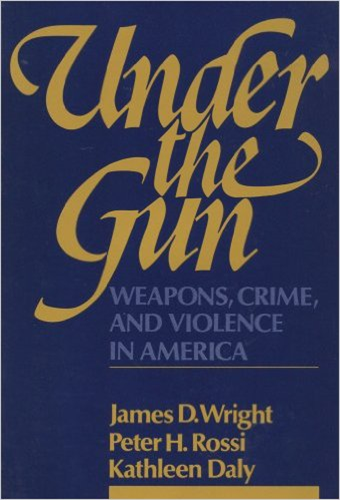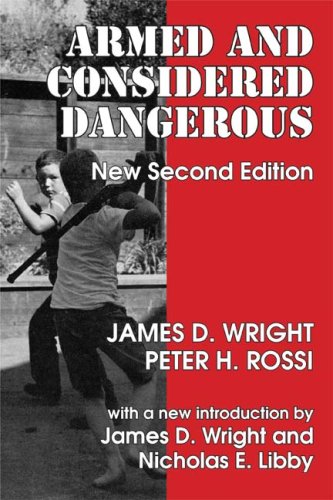NOTE: I am updating this very old (2016) post today because James Wright’s 1995 essay “Ten Essential Observations on Guns in America” will be central to the Sociology of Guns public webinar I will be teaching this spring.
Registration for this public webinar to be held on the Zoom Webinar platform is now open: https://wakeforest-university.zoom.us/webinar/register/WN_ZlTmDJkwQt2XDsDqpJYUOQ#/registration
My current registration limit is 500 and the course is half full, so reserve your spot now!
As I noted yesterday, I am organizing my Sociology of Guns seminar this semester around an essay published by sociologist James D. Wright in 1995, “Ten Essential Observations on Guns in America.”
James D. Wright (1947-2019) was Provost’s Distinguish Research Professor of Sociology and Director of the Institute for Social and Behavioral Sciences at the University of Central Florida, having previously been a member of the Departments of Sociology at Tulane University (1988-2001) and the University of Massachusetts at Amherst (1973-1988). He studied the formation of political attitudes, the social impact of natural disasters, and homelessness, and currently serves on the Board of Directors of the Coalition for the Homeless of Central Florida, the Homeless Services Network, the HOPE Helps Foundation.
Along the way, Wright conducted some of the earliest research on the sociology of guns. His first publication on the topic was in 1975 in the academic journal Social Problems: “The Ownership of the Means of Destruction: Weapons in the United States.” Along with this academic publication, he also placed a version of the work in the left-leaning magazine The Nation the same year.
Reflecting back on this in 1988, Wright acknowledged that his approach at the time was “unmistakably ‘anti-gun’.” (HT to K at Louisville Gun for posting Wright’s essay in The Public Interest, “Second Thoughts about Gun Control”.)
Subsequent to his first publication, Wright received grants in 1977 and 1981 from the National Institute of Justice to study guns and violent crime. The first grant resulted in a three-volume government report on “Weapons, Crime, and Violence in America” published in 1981, and a 1983 book Under the Gun.
The second grant led to the publication of Armed and Considered Dangerous: A Survey of Felons and Their Firearms in 1986. A second expanded edition was published in 1994 and was reissued with a new introduction in 2008.
Both books remain in print today, and were co-authored with Peter H. Rossi, who served as President of the American Sociological Association in 1979-80.
Reflecting on his program of firearms research in the 1988 Public Interest essay, Wright observed,
“…at the outset of the research program I had a strong feeling that the pro-gun-control forces had never marshalled their evidence in the most compelling way, that they were being seriously undercut by the more artful polemics of the National Rifle Association and related pro-gun groups. That the best available evidence, critically considered, would eventually prove favorable to the pro-control viewpoint was not in serious doubt—at least not to me, not in the beginning. In the course of my research, however, I have come to question nearly every element of the conventional wisdom about guns, crime, and violence.”
Published in 1995, “Ten Essential Observations on Guns in America” highlights Wright’s questioning of the conventional wisdom. For the record, his observations are as follows:
- Half the households in the country own at least one gun.
- There are 200 million guns already in circulation in the United States, give or take a few tens of millions.
- Most of those 200 million guns are owned for socially innocuous sport and recreational purposes.
- Many guns are also owned for self-defense against crime, and some are indeed used for that purpose; whether they are actually safer or not, many people certainly seem to feel safer when they have a gun.
- The bad guys do not get their guns through customary retail channels.
- The bad guys inhabit a violent world; a gun often makes a life-or-death difference to them.
- Everything the bad guys do with their guns is already against the law.
- Demand creates its own supply.
- Guns are neither inherently good not inherently evil; guns, that is, do not possess teleology.
- Guns are important elements in our history and culture.
I am looking forward to thinking about these observations along with my students this semester, especially considering how they may have changed over the past 20 years. I will share what I can from these explorations along the way.




[…] Source: James Wright – Ten Essential Observations on Guns in America […]
LikeLike
[…] other fascinating aspect of this scenario to me is that it reaffirms one of James D. Wright’s “Ten Essential Observations on Guns in America”: “The bad guys inhabit a violent world; a gun often makes a life-or-death difference to […]
LikeLike
[…] of studying illegal gun ownership suggests a somewhat different response. The 6th of Wright’s “Ten Essential Observations on Guns in America” is: “The bad guys inhabit a violent world; a gun often makes a life-or-death difference to […]
LikeLike
[…] his 1995 essay “Ten Essential Observations on Guns in America” — a core reading in my Sociology of Guns seminar this semester — James Wright […]
LikeLike
[…] am also pushing the students to engage even more with James Wright’s essay, “Ten Essential Observations on Guns in American Society.” At the end of each segment of the class, I will have the students say whether the reading(s) and […]
LikeLike
[…] in my last post, I am focusing my Sociology of Guns seminar around James Wright’s 1995 essay, “Ten Essential Observations on Gun in America.” Last week we addressed the first three of Wright’s observations […]
LikeLike
[…] about how many guns there are in America today, here I address the third of James Wright’s “Ten Essential Observations on Gun in America: Most of those (now 285 million or more) guns are owned for “socially innocuous sport and […]
LikeLike
[…] (twice, actually), and why people own them, I now consider the first of James D. Wright’s “Ten Essential Observations on Guns in America”: Half the households in the country own at least one […]
LikeLike
[…] have argued, following up on James Wright’s work from the 1990s, that sociologists have largely disregarded the lawful use of firearms by legal gun owners in favor […]
LikeLike
[…] James Wright – Ten Essential Observations on Guns in America […]
LikeLike
[…] James Wright – Ten Essential Observations on Guns in America […]
LikeLike
[…] James Wright – Ten Essential Observations on Guns in America […]
LikeLike
[…] James Wright – Ten Essential Observations on Guns in America […]
LikeLike
[…] James Wright – Ten Essential Observations on Guns in America […]
LikeLike
[…] James Wright – Ten Essential Observations on Guns in America […]
LikeLike
[…] James Wright – Ten Essential Observations on Guns in America […]
LikeLike
[…] beginning in March and is structured around revisiting James Wright’s classic 1995 essay, “Ten Essential Observations on Guns in America,” as I did when I taught Sociology of Guns at Wake Forest in Fall […]
LikeLike